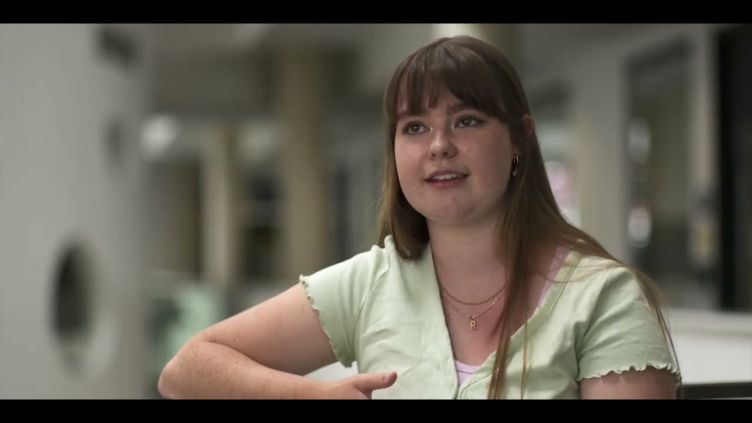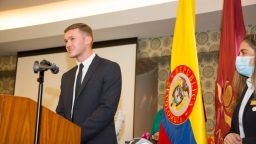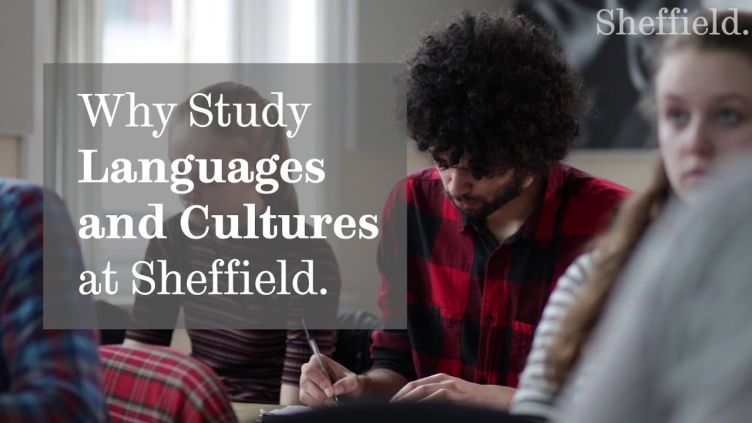Modern Languages and Cultures BA
2025-26 entryA modern languages and cultures degree at Sheffield is a confident step into the wider world. You'll graduate with skills that are highly valued by employers. You'll learn to communicate fluently and effectively in one, two or three modern languages and develop a sophisticated understanding of the countries where they’re spoken.
Key details
- A Levels ABB
Other entry requirements - UCAS code T900
- 4 years / Full-time
- September start
- Find out the course fee
- Foreign language study
- Study abroad
Explore this course:
Course description
Why study this course?
Students can choose from Catalan, Czech, Dutch, French, German, Italian, Luxembourgish, Portuguese, Russian and Spanish.
Try out one or two new languages and decide at the end of your first year what your portfolio will look like.
Although Europe remains our main focus, we take a special interest in European cultural, political and linguistic impact in the wider world such as French in Africa, and Spanish, French and Dutch in the Caribbean.
Languages can take you in many different directions and at Sheffield we offer a wide range of opportunities to gain and apply knowledge in the ‘real’ world during your degree, whether it is in our Spanish concert, performing a play or helping an author break into the British market by translating their work.

Learn to communicate fluently and effectively in one, two or three languages, while acquiring a sophisticated understanding of modern European cultures.
A modern languages and cultures degree allows you to study one, two or three languages, from a choice of 10. Whatever you choose, you’ll be able to combine areas of interest like visual cultures, literary studies, post-colonialism, and language families – structuring your studies according to what you find interesting.
With a year spent abroad, speaking the languages and studying or working in the cultures of your chosen countries, you’ll expand your personal and academic horizons. On your return to Sheffield you’ll build on your experience and take your linguistic skills to an advanced level.
Modules
You can find a comprehensive list of all of our languages and cultures modules broken down by language on the School of Languages and Cultures website.
The content of our courses is reviewed annually to make sure it's up-to-date and relevant. Individual modules are occasionally updated or withdrawn. This is in response to discoveries through our world-leading research; funding changes; professional accreditation requirements; student or employer feedback; outcomes of reviews; and variations in staff or student numbers. In the event of any change we'll consult and inform students in good time and take reasonable steps to minimise disruption.
Learning and assessment
Learning
You'll learn through a mix of lectures, seminars and language classes. Language teaching is in small groups, so you'll get plenty of tailored support and will get to know your tutors well.
Assessment
We use a range of assessment methods during your course. In the language programme you will be given regular homework assignments and take a mix of coursework and exam assessments at appropriate points over the academic year. You will be assessed on the core skills of speaking, listening, reading and writing. Our assessment methods vary across our courses and include taking sit-down exams, developing a portfolio, writing essays, taking part in group projects or giving individual presentations.
Programme specification
This tells you the aims and learning outcomes of this course and how these will be achieved and assessed.
Entry requirements
With Access Sheffield, you could qualify for additional consideration or an alternative offer - find out if you're eligible.
The A Level entry requirements for this course are:
ABB
typically including a modern foreign language
- A Levels + a fourth Level 3 qualification
- BBB typically including a modern foreign language + B in the EPQ
- International Baccalaureate
- 33 typically with 5 in a Higher Level modern foreign language
- BTEC Extended Diploma
- DDD in a relevant subject + an appropriate modern foreign language qualification
- BTEC Diploma
- DD + B at A Level typically in a modern foreign language
- Scottish Highers + 1 Advanced Higher
- AABBB + B typically in a modern foreign language
- Welsh Baccalaureate + 2 A Levels
- B + AB typically including a modern foreign language
- Access to HE Diploma
- Award of Access to HE Diploma in a relevant subject, with 45 credits at Level 3, including 30 at Distinction and 15 at Merit
-
If you are not studying a modern foreign language, the department will consider other evidence of aptitude for language learning (such as a languages GCSE at grade 6/B, or an English language qualification for non-native speakers of English)
The A Level entry requirements for this course are:
BBB
typically including a modern foreign language
- A Levels + a fourth Level 3 qualification
- BBB typically including a modern foreign language + B in the EPQ
- International Baccalaureate
- 32 typically with 5 in a Higher Level modern foreign language
- BTEC Extended Diploma
- DDM in a relevant subject + an appropriate modern foreign language qualification
- BTEC Diploma
- DD + B at A Level typically in a modern foreign language
- Scottish Highers + 1 Advanced Higher
- ABBBB + B typically in a modern foreign language
- Welsh Baccalaureate + 2 A Levels
- B + BB typically including a modern foreign language
- Access to HE Diploma
- Award of Access to HE Diploma in a relevant subject, with 45 credits at Level 3, including 24 at Distinction and 21 at Merit
-
If you are not studying a modern foreign language, the department will consider other evidence of aptitude for language learning (such as a languages GCSE at grade 6/B, or an English language qualification for non-native speakers of English)
You must demonstrate that your English is good enough for you to successfully complete your course. For this course we require: GCSE English Language at grade 4/C; IELTS grade of 7.0 with a minimum of 6.5 in each component; or an alternative acceptable English language qualification
Equivalent English language qualifications
Visa and immigration requirements
Other qualifications | UK and EU/international
If you have any questions about entry requirements, please contact the school/department.
Graduate careers
Our graduates are excellent communicators, confident and articulate, adaptable and culturally aware. They work in international development organisations, business and banking, translating, intelligence services, journalism, the charity sector, teaching, copywriting, publishing, theatre and television production, PR, and international sales and marketing.
Many of our students go on to postgraduate study, research, and an academic career.
The academic aptitude and personal skills that you develop on your degree will make you highly prized by employers, whatever your chosen career path after university:
- Excellent oral and written multilingual communication
- Intercultural awareness
- Independent working
- Time management and organisation
- Planning and researching written work
- Articulating knowledge and understanding of texts, concepts and theories
- Leading and participating in discussions
- Negotiation and teamwork
- Effectively conveying arguments and opinions and thinking creatively
- Critical reasoning and analysis
School of Languages and Cultures
At the School of Languages and Cultures you'll develop your linguistic skills to a very high level and deepen your understanding of the cultural context of the countries where your languages are spoken.
We offer a particularly wide range of languages - Catalan, Czech, Dutch, French, German, Italian, Luxembourgish, Portuguese, Russian and Spanish.
Right from the start, you'll work with the school's top specialists and native speakers who will help you realise your linguistic potential. Language teaching is in small groups, so you'll get plenty of support tailored to your needs and get to know your tutors well.
We're a leading centre for modern languages and cultures research. Our work spans identity, gender, linguistics, politics, migration and literary studies. This research informs our teaching, helping you to develop a global understanding of language and languages across cultures and countries.
You'll be able to study optional modules either in your individual languages, or across the school so you'll acquire an in-depth understanding of your chosen languages and their cultures, and how they relate to other languages and cultures across modern languages disciplines.
Our student-run language societies organise multilingual events, trips and creative projects. There are opportunities to volunteer in the community and in schools, inspiring others to try new languages.
School of Languages and Cultures students are based in the Jessop West building at the heart of the University campus, close to the Diamond and the Information Commons. We share the Jessop West Building with the Department of History and the School of English.
Facilities
School of Languages and CulturesUniversity rankings
Number one in the Russell Group
National Student Survey 2024 (based on aggregate responses)
92 per cent of our research is rated as world-leading or internationally excellent
Research Excellence Framework 2021
University of the Year and best for Student Life
Whatuni Student Choice Awards 2024
Number one Students' Union in the UK
Whatuni Student Choice Awards 2024, 2023, 2022, 2020, 2019, 2018, 2017
Number one for Students' Union
StudentCrowd 2024 University Awards
A top 20 university targeted by employers
The Graduate Market in 2023, High Fliers report
A top-100 university: 12th in the UK and 98th in the world
Times Higher Education World University Rankings 2025
Student profiles
Fees and funding
Fees
Additional costs
The annual fee for your course includes a number of items in addition to your tuition. If an item or activity is classed as a compulsory element for your course, it will normally be included in your tuition fee. There are also other costs which you may need to consider.
Funding your study
Depending on your circumstances, you may qualify for a bursary, scholarship or loan to help fund your study and enhance your learning experience.
Use our Student Funding Calculator to work out what you’re eligible for.
Year abroad
The year abroad is one of the most valued facets of a degree from the School of Languages and Cultures. All students studying a language with us will spend their third year either studying and/or working abroad.
You can choose to study at a university, gain work experience or teach English with the British Council in places such as: Spain, France, Germany, Netherlands, Portugal, Belgium, Austria, Switzerland, Latvia, Luxembourg, Kazakhstan, Argentina, Canada, Chile, Colombia, Ecuador, Mexico, Brazil, Peru and Reunion.
Visit
University open days
We host five open days each year, usually in June, July, September, October and November. You can talk to staff and students, tour the campus and see inside the accommodation.
Subject tasters
If you’re considering your post-16 options, our interactive subject tasters are for you. There are a wide range of subjects to choose from and you can attend sessions online or on campus.
Offer holder days
If you've received an offer to study with us, we'll invite you to one of our offer holder days, which take place between February and April. These open days have a strong department focus and give you the chance to really explore student life here, even if you've visited us before.
Campus tours
Our weekly guided tours show you what Sheffield has to offer - both on campus and beyond. You can extend your visit with tours of our city, accommodation or sport facilities.
Apply
Contact us
- Telephone
- +44 114 222 2864
- slc-admissions@sheffield.ac.uk
The awarding body for this course is the University of Sheffield.
Recognition of professional qualifications: from 1 January 2021, in order to have any UK professional qualifications recognised for work in an EU country across a number of regulated and other professions you need to apply to the host country for recognition. Read information from the UK government and the EU Regulated Professions Database.
Any supervisors and research areas listed are indicative and may change before the start of the course.





